Thursday, June 19, 2025
Review: The Fox In The Forest Duet - A fox took a stroll through the deep, dark wood
Sunday, June 15, 2025
Hand Limit Print Edition Is Coming!
Friday, June 13, 2025
5 Games That Take Up A Surprising Amount of Table Space
I know you can never judge a game by its box, but usually you can judge the scale of the game from the size of the box. Place a hefty Twilight Imperium or Gloomhaven down on a table and players will instantly brace themselves for a meaty game with lots of pieces, boards, tables, and figures. However, today we're looking at 5 games that come in deceptively small boxes but take up as much space on the table as a big box game.
Tiny Epic Dungeons - Gamelyn Games
We seem to always end up writing about the Tiny Epic series, but that's just because of how many boxes they seem to tick. In this case, Tiny Epic Dungeons ticks the box of being a table-filler. Arriving in a deceptively small box, you would be wise not to underestimate quite how much space this randomly generated dungeon crawl is.
In TE Dungeons, players race to find and battle a number of evil minions in the form of minotaurs, ogres, giant spiders, and more, to unlock the door to the boss' lair before their torchlight runs out and they are plunged into darkness. As Dungeon Crawls go the game is a perfect example of how the genre can be streamlined to just the basics and remain an engaging experience. The combat is satisfying, the loot rewarding, and the enemies deadly. The base game comes with a large number of different enemies to face and characters to play as, each with their own abilities, strengths, and weaknesses. We've had a copy for a few years now and it is one of the more regularly played titles, but no two games have ever felt alike.
This is a table filler of a game, and as the dungeon expands it's likely you'll wish you sat at a bigger table.
Tranquility - James Emmerson
Tranquility by James Emmerson comes in a delightfully small box, with some truly gorgeous artwork, but, you guessed it, takes up a surprising amount of table space. The cards, each sharing a similar footprint to the box, are arranged into a 6x6 grid pattern over the course of the game. This space is marked out at the start with a border of artwork cards, essentially extending the table space required to 7x7 of the box size, which I think beats Gloomhaven, or any of the 'havens, in box-to-table ratio (no I haven't measured this exactly).
Tranquility deserves this level of table space, however, as it is a beautiful and mindful experience. Albiet a very tricky one to get right. Players take turns laying cards down to fill the aforementioned grid with island pictures as you guide a sailor peacefully back home. The catch is that all cards must be placed in ascending order, providing a bit of intuition and guess work to keep things interesting. The game guide also recommends playing the game in silence, or next to silence, to enhance the peaceful tones of the game.
Bandido
Bandido is another tile placement game and it really feels like the theme for games that take up an unexpected amount of space require some form of tile placement. In this game, players cooperate to thwart the escape attempts of the titular Bandido as he tunnels his way out of prison. Players will place cards in turn, with limited communication, to guide the tunnels to dead ends, eventually closing off all open ends.
Because the tunnels are randomly generated, there is absolutely no way of knowing at the start of the game which direction it's likely to sprawl off in. Meaning that no matter where you place the starting tile, by about halfway through you'll be desperately trying to reconfigure the table to accommodate the chaotic tunnels.
The pocket-sized nature of this game could easily lull you into the false idea that it would be perfect for a quick game in a cafe. And while that is certainly possible, be prepared to panic when the drinks arrive and they have to be strategically placed around the table!
Lord of the Rings: Duel For Middle Earth
While the other games so far on this list have almost pocket-sized boxes, LOTR Duel is a little bigger from the start. However, we still feel like this game is surprising in the amount of space it takes up, and with good reason.
In LOTR Duel, 2 players take on the roles of the forces of Mordor and the free peoples of Middle Earth in a race for supremacy. Much like its older cousin 7 Wonders Duel, there are multiple ways to win this race. You can focus on uniting the various races, progressing the quest of the ring (or the Ring Wraiths if you are Mordor), or simple military might. It is a terrific game that has done amazingly in condensing the 3 different win conditions into a single game, where each one could have existed in its own right.
The board itself is only about as large as the game box but the real table hog comes from the card drafting. Cards are laid out in each of the 3 chapters of the game in a configuration that restricts what cards can be drafted at any one time. In a layout that resembles a tarot reading, cards are laid over each other to form shapes that slowly diminish as cards are revealed and drafted.
LOTR Duel is a brilliant game that had us hooked from the beginning, but you'll definitely need more space than the box suggests.
Any TTRPG
Not all Table Top Role Playing Games are created equal. Some are like Lasers & Feelings, requiring little more than a notebook, a pen, some dice, snacks, drinks, fidget toys for those that need them, GM notes, maybe a GM screen. Others, like Dungeons & Dragons, require all that plus the many source books required for playing each scenario, battle maps, miniatures, etc.
Our years playing TTRPGs have taught us one thing, there is never quite enough room for everything that's needed. Players and their bits and bobs, like water, always seem to expand to fill the space they have. Why do you think character sheets always get stuff spilled on them?
Wednesday, June 11, 2025
Hand Limit 2025 Event: Canterbury Pride Board Game Club
Wednesday, June 4, 2025
Hand Limit 2025 Event: Canterbury Pride Board Game Club Update
Monday, June 2, 2025
Gaming the System: Changing the World One Game at a Time
Gaming the System is a Canterbury-based board gaming group that meets twice a month at The Long Rest gaming cafe and promises the prospect, as stated above, of playing games through a political lens. That is not to say that all the games they play are explicitly political, only they are choosing to look deeper beneath the surface at what lessons the games we play may teach us, from climate change to LGBTQ+ history.
I was lucky enough to be invited along to their most recent meet up by one of their members, Rea, and the evening did not disappoint. I was introduced to many lovely members and had the opportunity to play Molly House, a game about the secret gay clubs of Victorian London. It was a great experience and I really enjoyed the opportunity to play something that was not only entertaining but provided an insight into the struggles of the LGBTQ+ scene in the 18th century. Conversation was enthusiastic and varying, and without having known each other more than an hour previously, all the players around the table were working together to create joy for the miniature gay community. Albeit we did have a couple of traitors around the table (I admit, I was one of them - I do love chaos). It was a perfect example of how board games give people the space and structure to meet new people and open conversation on larger subjects.
"Just don't ask us to define what we mean by political," said one of their members when asked. They went on to say that games offer the opportunity to build dialogue across political divides and allow for the exchange of ideas in a safe environment and one that encourages empathy.
As a believer that politics is morality in practice, I couldn't agree more that board games have the power to raise political questions, and the playing of games can even be seen as a political act in itself. I have written before about Play as an Act of Rebellion, and I truly believe that everything we do, especially that which affects others around us, can be seen as an act of politics (with a lower-case p).
I think what Gaming the System is doing is fantastic and shows genuine thought and understanding of the table top hobby. Board games are escapism and entertainment, yes, but they can also be a social tool to develop community and promote positive well being. The more groups like this, the stronger the local and global community of gamers will become. Political discourse should be embraced and we should all be encouraged to view all that we do, even our entertainment, in terms of its wider moral and philosophical meaning.
I was completely charmed by the group and will make sure that I attend future gaming events. I also look forward to seeing them at our upcoming Pride Board Game Club, which is raising money for the BeYou project.
Friday, May 30, 2025
Review: Molly House - Party Hard or Hardly Party
I recently had the opportunity to play Molly House by Jo Kelly, Cole Wehrle, and Ricky Royal and had a thoroughly brilliant time.
"It's 1723. You walk through the streets of London, hiding your inner-most desires from the Society of the Reformation of Manners as you head to Mother Clap's. This may look like a coffee shoppe but inside are back rooms where loud festivities, intimate gatherings, and a thriving queer community is growing."
Over the course of 5 weeks, which act as rounds, players take the roles of gender-defying mollies and work together to grow the joy of the community, whilst also competing to be the most joyous individual. There is a risk-reward aspect to this, however, as while throwing excellent parties helps move counters along the joy track, they also have the potential to increase the gossip spreading about each of the four Molly Houses on the game board. Too much gossip will bring evidence against the Houses which can result in them being closed down. Even worse, players with too much reputation at these Houses risk getting indictments, the punishments for which can either be a reduction in joy or death by hanging. In classic Wehrle style, more mechanics is better, and there is also a system by which you can choose to betray your own community for your own selfish gains.
A key part of the game is the throwing of parties, which involve players taking it in turns to play cards in an attempt to create a poker-like communal hand that dictates how successful the party is. These range from dances, to christenings (in the historical Molly House sense), and if the communal hand played is a complete dud, a "quiet gathering". These quiet gatherings are likely to lose you reputation but can also be handy ways of throwing the Society of the Reformation of Manners off the scent.
I am fairly new to Cole Wehrle games, having only played Root once before and relatively recently, but the game definitely had his signature mark of very in-depth rules and numerous different play styles available. However, I have been informed that the real brains behind the game was Jo Kelly, an LGBTQ+ board game designer from Bristol.
The art style is very satisfying and each of the cards that players use to build hands, which can be played at parties or to increase their reputation at the different Molly Houses, contain lovely imagery and quotes from actual historical indictments of the individuals mentioned in the game. Everything about the experience shows that the core theme was a true passion project and it has been handled with great care. It was a great experience to play a historical-political game that doesn't revolve around global conflict and instead provided an insight into a key moment in LGBTQ+ history.
While I am a fan of a good crunchy experience, I did find that the multitude of different mechanics in Molly House was slightly overwhelming at the beginning of the game, and by the time the game ended (which admittedly was early because we accidentally got one of the Molly Houses raided twice - a game ending condition) I still only had the barest of grasps on how the game worked, let alone be able to properly strategise. In comparison with Root, which also has a steep learning curve, I would say it comes off slightly more complex and probably requires a couple of games before you can understand it well enough to truly play the game as intended.
Overall, it was a very fun experience and there was a lot of laughter and joy around the table as we played in the most chaotic way possible. I would love the opportunity to play this game again with a better understanding of how it all works.
Featured Article
Games on Location: Episode 3 - The Bloody Inn
Episode 3 of Games on Location is taking a morbid turn with Nicolas Robert's The Bloody Inn, published by Pearl Games. With Spooky Seaso...
Most Popular Post
-
With less than a month to go preparations are well under way for the first ever Hand Limit event and it's exciting to see everything com...
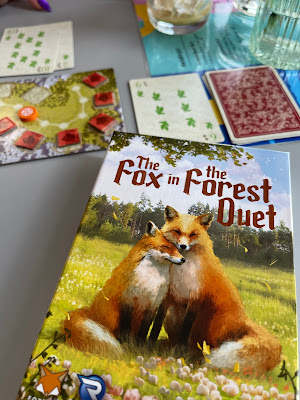
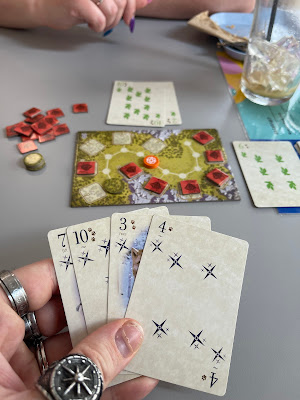









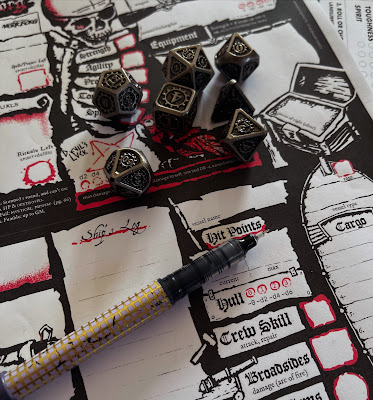


.jpeg)

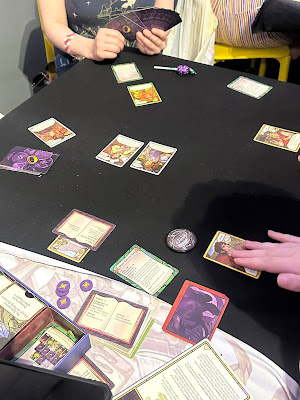

.jpg)


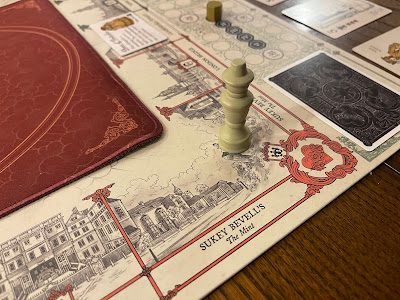

.jpg)